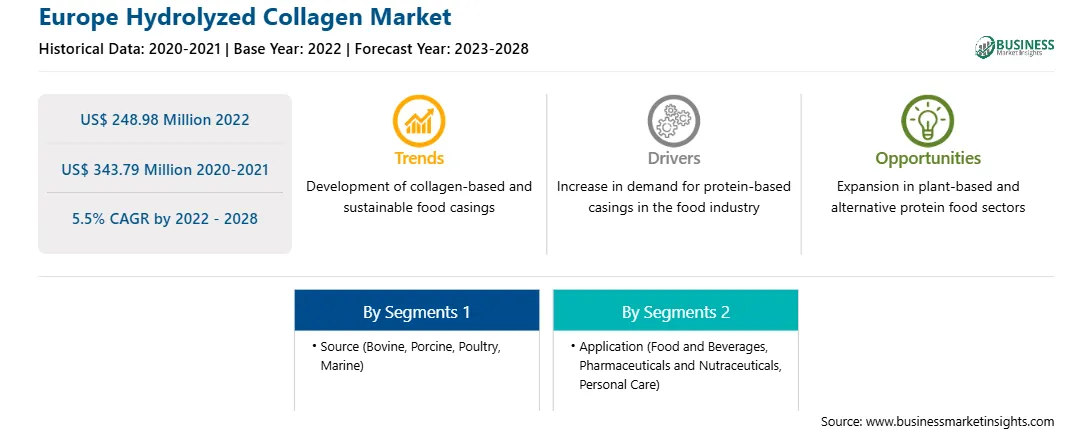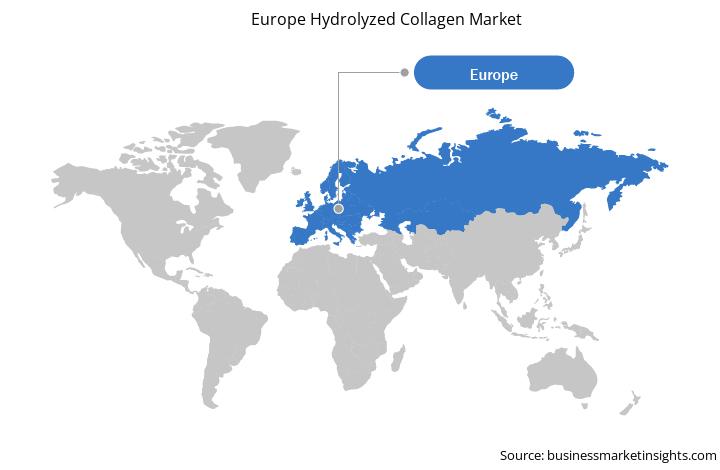Hydrolyzed collagen is a structural protein produced by hydrolysis of collagen found in connective tissue, skin, tendons, bones, cartilage, and other body parts. It supports tissues structurally and is involved in cellular functions such as tissue healing, immunological response, cellular communication, and cellular migration. Collagen is generally obtained from bovine connective tissues or marine sources. It has many applications across multiple end-use industries, including food & beverages, pharmaceuticals & nutraceuticals, and personal care. In the food & beverages industry, hydrolyzed collagen is used in yogurts, confectioneries, nutritional bars, ready-to-drink beverages, and others. Hydrolyzed collagen-induced foods and beverages enhance protein levels in the body; moreover, they help repair skin texture, improve bone and muscle health, and strengthen joints. Rising awareness regarding the health benefits of hydrolyzed collagen among customers is driving the demand for hydrolyzed collagen-induced foods and beverages. According to the National Center for Biotechnology Information, 5 g of collagen peptide per day in postmenopausal women can raise bone mineral density (BMD) and enhance bone formation. This can significantly reduce their risk of osteoporosis. According to the International Osteoporosis Foundation, ~5.2% of the UK population was diagnosed with osteoporosis in 2019. Rising research studies over the effectiveness of hydrolyzed collagen on osteoporosis is expected to boost the market growth among the target audience. Hydrolyzed collagen is becoming increasingly popular across the nutraceutical industry. They are used to manufacture dietary supplements and protein powders. In the past few years, the demand for dietary supplements has increased dramatically due to increasing consumer preference for products boosting physical strength and fitness. Hydrolyzed collagen is easy to digest and can slow down a body's aging process, if consumed regularly. Manufacturers are launching a wide range of hydrolyzed collagen supplements. Moreover, hydrolyzed collagen is used in sports nutrition products to maintain joint and bone health. Hydrolyzed collagen also has significant applications in the biomedical and tissue engineering fields. It is used in various medical devices, including wound dressings and fillers for bone voids. Hydrolyzed collagen and gelatin have strong cell adhesion, biocompatibility properties, and a high degree of formability. Hydrolyzed collagen is a prominent extracellular matrix component (ECM) in many tissues and organs. It plays a vital role in the formation of tissues and the preservation of proper tissue architecture and function. As a result, cell transplantation carriers have been developed using different collagen scaffolds, such as sponges and gels. Thus, the growing demand for hydrolyzed collagen for various applications also propels the market growth.
The hydrolyzed collagen market in Europe is segmented into Germany, France, Italy, the UK, Russia, and the Rest of Europe. Demand for food supplements with extra nutrients and popularity of antiaging beauty products are the two major trends shaping the hydrolyzed collagen market in the region. Such evolving lifestyle trends related to the food supplement industry are remarkably influencing the purchases of consumers. Moreover, food supplement providers are changing their offerings to meet consumer preferences in the region. Hydrolyzed collagen supplements help in healthy weight loss and improved bone health. Thus, the growing trend of taking supplements in the form of processed food, such as protein chocolate powder, bars, and beverages, is supporting the hydrolyzed collagen market growth in Europe.
Strategic insights for the Europe Hydrolyzed Collagen provides data-driven analysis of the industry landscape, including current trends, key players, and regional nuances. These insights offer actionable recommendations, enabling readers to differentiate themselves from competitors by identifying untapped segments or developing unique value propositions. Leveraging data analytics, these insights help industry players anticipate the market shifts, whether investors, manufacturers, or other stakeholders. A future-oriented perspective is essential, helping stakeholders anticipate market shifts and position themselves for long-term success in this dynamic region. Ultimately, effective strategic insights empower readers to make informed decisions that drive profitability and achieve their business objectives within the market. The geographic scope of the Europe Hydrolyzed Collagen refers to the specific areas in which a business operates and competes. Understanding local distinctions, such as diverse consumer preferences (e.g., demand for specific plug types or battery backup durations), varying economic conditions, and regulatory environments, is crucial for tailoring strategies to specific markets. Businesses can expand their reach by identifying underserved areas or adapting their offerings to meet local demands. A clear market focus allows for more effective resource allocation, targeted marketing campaigns, and better positioning against local competitors, ultimately driving growth in those targeted areas.Europe Hydrolyzed Collagen Strategic Insights

Europe Hydrolyzed Collagen Report Scope
Report Attribute
Details
Market size in 2022
US$ 248.98 Million
Market Size by 2028
US$ 343.79 Million
Global CAGR (2022 - 2028)
5.5%
Historical Data
2020-2021
Forecast period
2023-2028
Segments Covered
By Source
By Application
Regions and Countries Covered
Europe
Market leaders and key company profiles
Europe Hydrolyzed Collagen Regional Insights

The Europe hydrolyzed collagen market is segmented based on source, application, and country. Based on source, the Europe hydrolyzed collagen market is segmented into bovine, porcine, poultry, marine, and others. The bovine segment held the largest market share in 2022.
Based on application, the Europe hydrolyzed collagen market is segmented into food and beverages, pharmaceuticals and nutraceuticals, personal care, and others. The pharmaceuticals and nutraceuticals segment held the largest market share in 2022.
Based on country, the Europe hydrolyzed collagen market is segmented into Germany, the UK, France, Italy, Russia, and the Rest of Europe. The Rest of Europe dominated the Europe hydrolyzed collagen market share in 2022.
Ewald-Gelatine GmbH; Gelita AG; Rousselot BV; Nitta Gelatin Inc.; Protein SA; ConnOils LLC; Norland Products LLC; Tessenderlo Group NV; Titan Biotech Ltd; and Viscofan DE GmbH are the leading companies operating in the Europe hydrolyzed collagen market.
The Europe Hydrolyzed Collagen Market is valued at US$ 248.98 Million in 2022, it is projected to reach US$ 343.79 Million by 2028.
As per our report Europe Hydrolyzed Collagen Market, the market size is valued at US$ 248.98 Million in 2022, projecting it to reach US$ 343.79 Million by 2028. This translates to a CAGR of approximately 5.5% during the forecast period.
The Europe Hydrolyzed Collagen Market report typically cover these key segments-
The historic period, base year, and forecast period can vary slightly depending on the specific market research report. However, for the Europe Hydrolyzed Collagen Market report:
The Europe Hydrolyzed Collagen Market is populated by several key players, each contributing to its growth and innovation. Some of the major players include:
The Europe Hydrolyzed Collagen Market report is valuable for diverse stakeholders, including:
Essentially, anyone involved in or considering involvement in the Europe Hydrolyzed Collagen Market value chain can benefit from the information contained in a comprehensive market report.